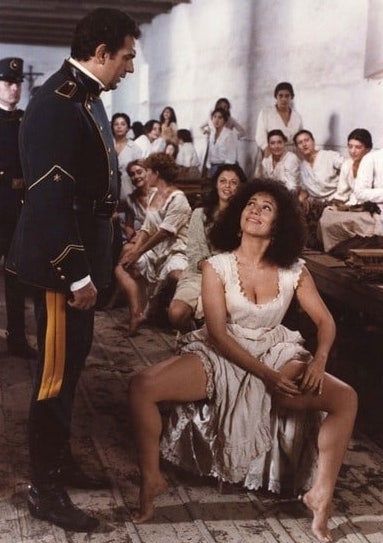Friday, March 8, 1985.
CARMEN. Co-written by Tonino Guerra. Based on the 1875 opera by Georges Bizet, and the 1846 novella by Prosper Mérimée. Libretto by Henri Meilhac and Ludovic Halévy. Co-written and directed by Francesco Rosi. Running time: 152 minutes. Mature entertainment, sung in French with English subtitles.
CARMEN IS NO LADY. A gypsy seductress who glories in her conquests, her raw sexuality and violent passions once scandalized polite Parisian society.
Premiered at the Opéra-Comique on the evening of March 3, 1875, Georges Bizet's adaptation of Prosper Mérimée's romantic tragedy was savaged by the critics and shunned by the public.
With rather more foresight, the composer's contemporary Peter Tchaikovsky predicted that Carmen would, one day, be the most popular opera in the world.
Her tempestuous story has inspired at least a dozen films since the coming of sound, the most recent [1984] being director Francesco Rosi's attempt to mount a full, faithful adaptation of the original opera. Premiered in Paris one year ago, it achieved the acclaim and success that eluded Bizet in his own lifetime.
You have to marvel at the consistency of the Parisians. They are just as wrong now as they were then. For all of its ambition, Rosi's Carmen is a big screen bomb.
It's sung well, of course. Tenor Placido Domingo (as Don José), mezzo-soprano Julia Migenes-Johnson (Carmen) and baritone Ruggero Raimondi (Escamilla) all know their way around an aria.
The problem is one of visual conception. Unlike Franco Zeffirelli, who turned his 1983 motion picture La Traviata into a sumptuous cinematic fantasy, Rosi is as obsessive about realism as poor Don José is about his gypsy girl.
Clutching the same set of Doré illustrations that inspired Bizet, Rosi went on location in Andalusia. It escaped his notice that none of his principals fit in well with the period scenery.
Raimondi's toreador is beefier than any of his bulls. Migenes-Johnson, who would look more at home in New York's garment district than a Seville cigarette factory, gives a performance that smoulders when it should sizzle.
Even the Spanish-born Domingo makes his lovesick dragoon look like a man with too much starch in his shorts. His first-act duet with soprano Faith Esham's Micaëla recalls Nelson Eddy and Jeanette MacDonald at their wooden worst.
Add Antonio Gades’s lumpen choreography, the utterly tone-deaf editing and a supporting chorus that appears under-rehearsed, and you have a film that only a half-blind culture vulture could love.
Exclude the superb soundtrack (available as a phonograph recording), and this Carmen has less real art in it than Bo Derek's Bolero [1984].
The above is a restored version of a Province review by Michael Walsh originally published in 1985. For additional information on this archived material, please visit my FAQ.
Afterword: Antonio Gades, whose “lumpen choreography” I noted in the above review, was in fact considered the greatest Spanish male dancer of his generation. When he died in 2004, the Guardian newspaper detailed his achievements in a respectful obituary that insisted he “was not just a dance revolutionary, but a political revolutionary.” It also recalled his screen career — “three stunning films directed in the 1980s by Carlos Saura show us Gades at his peak. These were Bodas De Sangre (Blood Wedding), Carmen and El Amor Brujo (Love The Magician) — while politely ignoring his work with director Francesco Rosi on a second film called Carmen.
Saura’s picture, a ballet designed as a celebration of Spanish dance that featured Gade in a starring role, was released in 1983 and arrived in Vancouver the next year. (Click on this Carmen link to see my positive review of their collaboration.) I certainly agreed with the Guardian writer who found it “stunning.” Rosi’s film, released in 1984, went in a very different creative direction. There were those who liked it a lot more than I did, and it was nominated for a lot of international awards. The soundtrack album (that I did like) won the 1985 Grammy Award in the Best Opera Recording category.
